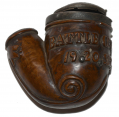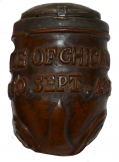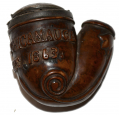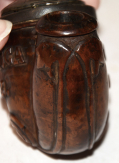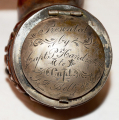site search
online catalog
CIVIL WAR CARVED PIPE WITH CHICKAMAUGA BATTLE HONOR PRESENTED BY CAPT. PETER HAND 24th ILLINOIS TO CAPT. FERDINAND BOLTZ, 88th INDIANA
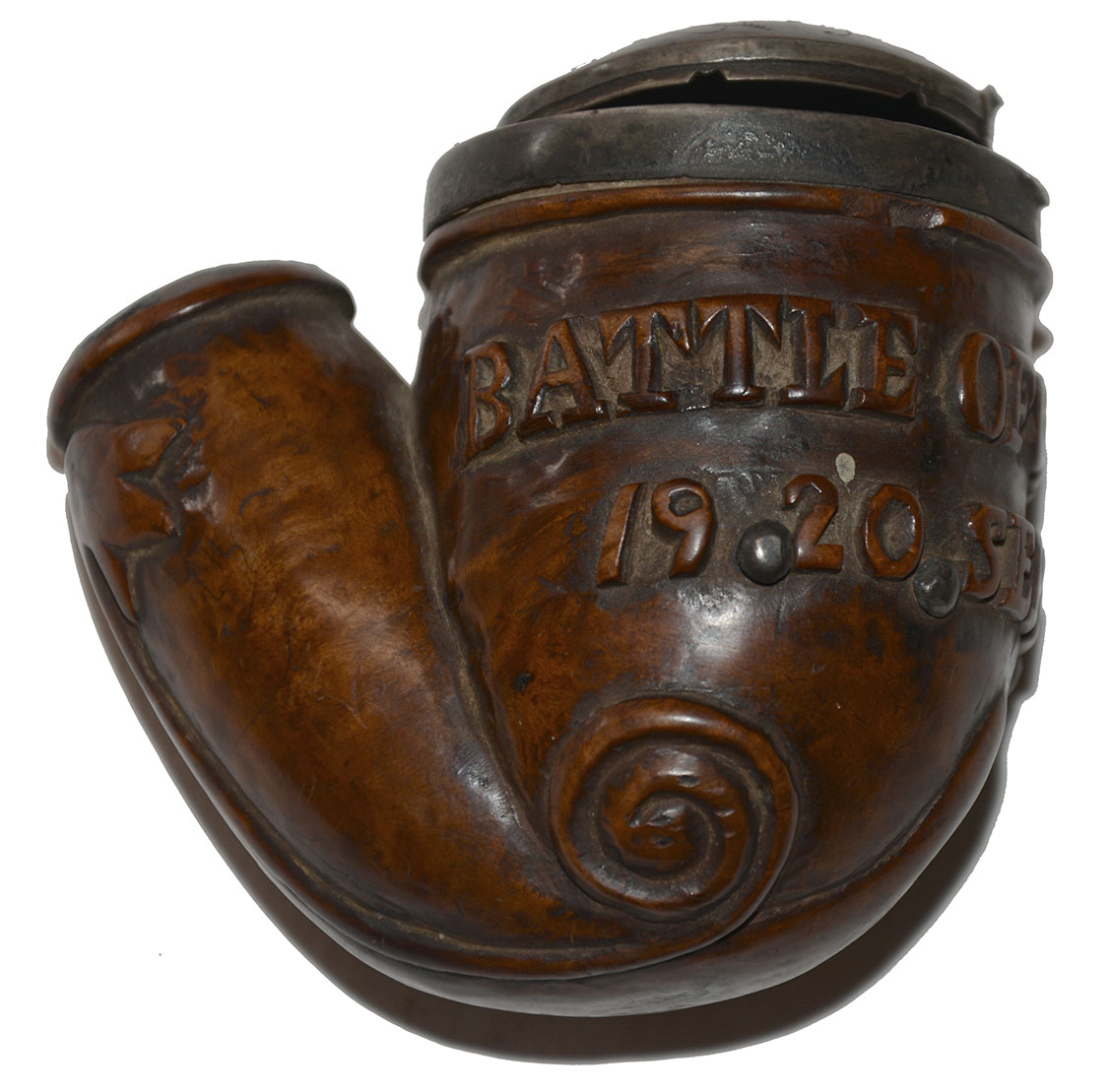
$3,500.00 SOLD
Quantity Available: None
Item Code: 766-2028
This is a very well-made carved pipe presented by one Civil War officer to another and is a great example of Civil War camp art, created in moments of leisure or boredom in winter camps, and in this case enhanced a battle honor carved in relief and by a silver cap with an elegant inscription. The condition is excellent, with nice color, burl graining, surface, and rich patina from handling. The back of the pipe has the shank set against the bowl with a raised oblong panel running down to the underside with a narrow, raised ridge running along either side, touching at the top and spreading out into a sort of abstract tree-top pattern with overhanging angular leaves. The lower portion of each ridge on the underside of the pipe then turns outward to form a raised spiral on the lower sides of the bowl. Both the shank and the bowl have a raised rim. The face of the bowl is a carved with raised letters: “BATTLE OF CHICKAMAUGA / 19. 20. SEPT. 1863.” The first three periods are made with small tacks. The last is a raised dot of wood.
The top of the bowl measures about 1 5/8” across and has a thin metal rim covering the top edge and side, with a round convex cap hinged at the rear, both apparently tarnished silver. The top of the cap is professionally engraved, “Presented / by / Capt. P. Hand 24th ills. / to / Capt. / F.F. Boltz 88th Ind.” with all the lettering in script except for Bolt’s rank, which is in shaded block letters, and flourishes are added to the “by,” “to,” and Boltz’s rank.
The condition is excellent. We see just one very small chip to the rim of the bowl on the front left, above the “E” of “BATTLE.” The metal periods, with aged patinas, might have been used in preference to trying to carve small dots for all the periods. There is a little dark roughness to the surface around the final period and beneath the “3” that was likely a difficult spot in the wood, but this is not very noticeable.
Peter Hand (1835-1899,) who presented the pipe, was a resident of Chicago and cigar-maker by profession when he enlisted in the 24th Illinois 4/16/61 and served as a corporal for three months before being elected 2nd Lt of Co. G on 6/30/61. He was promoted to 1st Lieutenant of the company, mustering in at his new rank to date 12/2/61. He was commissioned Captain 7/29/62 and transferred to Co. K, with his muster at that rank dating to 11/24/62. Except where nothing is stated, muster rolls list him present throughout his service until muster out on 8/15/64 with the exception of being listed as Absent Without Leave in Chicago on the November-December 1862 roll, which must be a matter of paperwork and reflect a sick leave for a wound to the left breast and shoulder received at the Battle of Perryville, Oct. 8, 1862. He seems to have been a firm abolitionist and man of principle he submitted a resignation in June 1862 rather than obey orders to arrest fugitive slaves in the camp, or any persons thought to be, finding the order, “incompatible with my honor and principles.”
Ferdinand F. Boltz (1839-1926) the recipient, was from Ft. Wayne, Indiana, and had enlisted for one year’s service in the 12th Indiana, being quickly promoted to First Sergeant and then regimental Sergeant Major. Upon discharge in 1862 he enlisted again, receiving a commission as 2nd Lt to date 8/16/62 in the 88th Indiana. He served as Acting Adjutant in the regiment from 12/12/62, was promoted to 1st Lieutenant 3/1/63, and was regularly appointed Adjutant 8/1/63. He was promoted to Captain in early 1864, officially being mustered in in March with his discharge as 1st Lieutenant dated 2/8/64 and muster in as Captain of Co. F to date 2/9/64. He held this rank until mustering out 6/7/65, though from January 1864 to April 23, 1864, he served again as Acting Regimental Adjutant. During that period he was severely wounded in the left foot at Utoy Creek 8/7/64, but returned to duty 9/22/64. His memorandum and expense book with diary entries for 1864-65 is at Duke University and accessible online, as are photographs of him as Sergt.-Major in the 12th and an officer in the 88th Indiana.
Both the 24th Illinois and 88th Indiana fought at Chickamauga and as part of the 14th Army Corps were part of George H. Thomas’s defense of the Union left. Both officers are listed as present on the muster rolls covering the period and Boltz would have been serving as Acting Adjutant, giving him some prominence. The regiments served at the time, however, not only in different brigades, but in different divisions of the 14th Corps, and we don’t see specific interaction of the two regiments on the field, so the pipe may be less a memento of a particular encounter in the battle than a commemoration of their common participation in that great battle, likely created in the winter camps of 1863-1864 and after Boltz’s official promotion to Captain, though his official date of rank would be fixed as September 22, 1863, from a vacancy created by the battle.
Whether Boltz and Hand knew one another before this period is unclear. They were residents of different states before the war and after. And, there seems to have been only one point when their units were in the same brigade: in April 1863 the 24th Illinois was moving into the 2nd Brigade, 1st Division, 14th Corps, and the 88th Indiana was moving out of it, so there may have been some literal passing acquaintance. They did, however, share a common German background: both had been born in Prussia in the 1830s, though in different towns and apparently emigrating a few years apart. That may have provided a connection through some sort of German-American association in the army’s winter camps.
Another possible point of intersection corresponds to the approximate date of the presentation, which is unlikely to predate Boltz’s commission and muster as Captain by much and the prominence of his rank as “Capt.” in the inscription, between flourishes and the only word in shaded block letters, likely points a date roughly in the February-March 1864 time period. While at that point Boltz and Hand were in different brigades they were both in the 1st Division of the 14th Corps and both were acting as field and staff officers: Boltz as acting adjutant again in the 88th and Hand as temporary commanding officer of 24th after the death of their Colonel and resignation of their lieutenant Colonel.
That seems as far we can push a particular connection and date. Hand left the service in August 1864 and Boltz in June 1865, returning to Illinois and Indiana respectively, with common membership in the G.A.R. for instance, but no evident direct connection. An encounter in August 1864 when Boltz was wounded and Hand was leaving the service, seems less likely or also less significant than earlier possible encounters. The pipe, however, is a wonderful creation in itself, a great combination of art and history, with creating a connection between two officers with fighting records for the Union in the Civil War. We include full copies of their service and pension records with the pipe, (which we have read, as we did his memorandum book at Duke,) which yet might yield more clues. [sr][ph:L]
~~~~~~~~~~~~~~~~~~~~~~~~~~~~~~~~~~~
THIS ITEM, AS WITH ALL OTHER ITEMS AVAILABLE ON OUR WEB SITE,
MAY BE PURCHASED THROUGH OUR LAYAWAY PROGRAM.
CLICK HERE FOR OUR POLICIES AND TERMS.
THANK YOU!
Inquire About CIVIL WAR CARVED PIPE WITH CHICKAMAUGA BATTLE HONOR PRESENTED BY CAPT. PETER HAND 24th ILLINOIS TO CAPT. FERDINAND BOLTZ, 88th INDIANA
For inquiries, please email us at [email protected]
Most Popular
Historical Firearms Stolen From The National Civil War Museum In Harrisburg, Pa »
Theft From Gravesite Of Gen. John Reynolds »
Selection Of Unframed Prints By Don Troiani »
Fine Condition Brass Infantry Bugle Insignia »
British Imported, Confederate Used Bayonet »
Piece Of Wood From The Room In The White House Where Lincoln Signed The Emancipation Proclamation »
featured item
BREVET MAJOR GENERAL’S COMMISSION AND G.A.R. BADGE OF SAMUEL SPRIGG CARROLL: HIS TROOPS HELPED SAVE CEMETERY HILL ON JULY 2 AND TO REPULSE PICKETT ON JULY 3 AT GETTYSBURG
Carroll was a fighting general who acquired several nicknames from his red hair along with three wounds and a number of promotions and brevets for his service on the battlefield. He received several brevets for actions in individual battles: major… (2020-894). Learn More »
site search
Upcoming Events
The shop will remain closed to the public through Friday, Jan. 31st, re-opening on Saturday, Feb.… Learn More »



